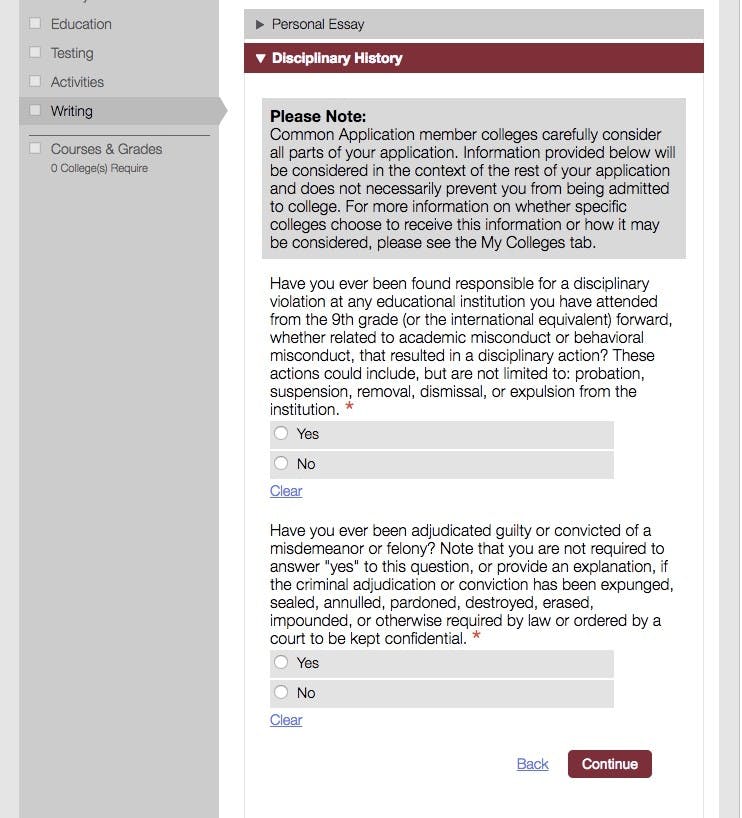The Common Application, the prominent college admission application used by more than 700 universities, will no longer ask potential college students for their criminal history, beginning on Aug. 1 of this year.
This change, however, will not affect future UR applications.
UR will continue to ask applicants of their criminal history in its individual portion of the application, Marilyn Hesser, executive director of admission, wrote in an email.
“For the 2019-2020 application season, Richmond will collect criminal history information from applicants on Richmond's Supplement, our individual member screen,” Hesser wrote. “Our admission review process will remain unchanged as a result of The Common Application decision.”
According to the Common Application, “Institutional policies and practices around criminal history have become less ‘common,’ based on continually evolving legislation at the local, state, federal, and international levels, as well as increasingly varied policies and practices among Common App member institutions.”

The current criminal history question on the Common Application, which will no longer exist come Aug. 1. Image via the Common Application.
The “Ban the Box" movement is an international campaign from the mid-2000s promoting the removal of the criminal history question on the basis that it hinders previously incarcerated people from being able to start anew.
It is now illegal for public and private employers to have a criminal history question in 11 states, according to the National Employment Law Project.
Sylvia Gale, director of the Bonner Center for Civic Engagement, teaches the first-year seminar, "Storytelling for Social Change," which involves visiting the Bon Air Juvenile Correctional Center. Gale supported the notion to remove the criminal history question, she said.
“I am not an expert in the system,” Gale said. “But I have learned a lot, such as the disproportionate number of young people of color locked up in the criminal justice system. The system as a whole is rigged to unfairly punish kids who come from backgrounds where they have faced tremendous challenge.
"If you remove one of those obstacles, which [the criminal history question] is, you are giving these kids a second chance to try again.”
Black youth make up only 20 percent of Virginia's youth population, but account for 43 percent of juvenile intakes, 56 percent of detainments and 71 percent of admissions to direct care, according to RISE for Youth 2016.
Enjoy what you're reading?
Signup for our newsletter
UR and other U.S. institutions face the dilemma between giving post-detention youth the possibility for a second chance and the responsibility of keeping the campus community a safe environment.
Along with the rise of the Ban the Box movement has come the rise of the #MeToo movement, a campaign with the vision of interrupting sexual violence within communities, according to the campaign's website.
But lack of knowledge about those who enter campus poses the possibility of unknown predators entering these communities.
“Our ultimate goal is to make sure students are safe, from either any information put on the Common App or a Dean’s Certification, if they are transferring,” Tracy Cassalia, deputy Title IX coordinator for students, said.
Cassalia affirmed that the university would be notified of the criminal history of either potential first-year or transfer students. Students transferring from UR who are either suspended, permanently dismissed or withdrawn while under investigation for sexual assault or harassment will also get a notation on their transcript, Cassalia said.
Junior Tracy Naschek said that, regardless of these policies, the university should still not have the criminal history box. Naschek took a first-year seminar called "Storytelling and Identity" and also visited the Bon Air Juvenile Correctional Center regularly.
“[The decision to have the criminal history question because it informs admissions about sexual predators] imagines that everyone who has sexually harassed or assaulted someone is in jail or has been in jail, which is not true,” Naschek said. “I think it’s ironic that we have a class that goes to the detention center – we are making friends, bridging gaps and learning the stories of people who are more similar to us than we think – when Richmond, as a university, is implicating itself even further when criminalizing these people.”
UR employee applications, however, will no longer have a criminal history question, Carl Sorensen, senior associate vice president of human resources, said.
Background checks will be completed only for all final-selection candidates, he said.
“There was data that indicated that managers, when they saw it, would dismiss the application,” Sorensen said. “From our perspective, it didn’t have any adverse effect on the hiring process. And it’s a good thing because we are considering people as finalists without that prescreen nor bias.”
Removal of the criminal history box will not remove the appearance of a criminal history on prospective students' applications, Naschek said.
“It is a step in the right direction,” she said. “But if you are in a detention center from when you’re 14 until you’re 18, your high school was in a detention center.”
Gale said she hoped that there would be attention toward mitigating the impact of the criminal history question, as UR will have the question on its application for the 2019-2020 school year.
“I have concerns, but more questions for my colleagues,” Gale said. “What are we doing to give those applicants a fair review? We carry around an assumption that we know about people there.
"We are human. We share a lot in common. Once you see that, you can no longer ignore this whole group of people who were locked up in jail."
Contact news writer Olivia Diaz at olivia.diaz@richmond.edu.
Support independent student media
You can make a tax-deductible donation by clicking the button below, which takes you to our secure PayPal account. The page is set up to receive contributions in whatever amount you designate. We look forward to using the money we raise to further our mission of providing honest and accurate information to students, faculty, staff, alumni and others in the general public.
Donate Now



